
Farm markets have become a national movement.
With thousands around the country and hundreds in Michigan, they’ve become one of the best places to score high-nutrition, fresh-from-the-field produce and quality proteins.
The trouble is they’ve become so popular they’re also a place to find other things, too—from high-calorie local baked goods to expensive, out-of-season offerings.
In summer, crowded markets offer so much razzle-dazzle that it’s a little too easy to overlook the nutrition bargains.
And in winter, shoppers tend to forget about markets altogether.
That’s a mistake, said Kristi Veltkamp, a registered dietitian at Spectrum Health and a fan of farmers everywhere.
The right strategy can make every market trip count, no matter what the season.
Veltkamp’s favorite tips:
Know what’s in season
Do some research before you go. Online guides tell you what types of produce you’ll likely find and offer nutritional information, recipes and ideas about storing and processing foods.
“Otherwise, you’re likely to wind up with a crisper full of bargain vegetables that go to waste,” Veltkamp said.
Winter offerings are likely to include salad selections and microgreens, as well as crops that overwinter well. Between hydroponics, hoop houses and traditional agriculture techniques, Michigan farmers coax crops all year long. You’ll find plenty of kale, beets, carrots, turnips and radishes.
Chat up your farmer
We should all be friendlier to farmers, just on principle. They work hard and we’d be sunk without them.
But the chance to talk to agricultural workers is one of the best parts of the market. “They’re full of information and, often, they’ve got their favorite recipes and ideas I’d never considered,” Veltkamp said.
Focus on freshness
The moment a vegetable leaves the vine, it begins to lose nutritional punch.
“Often, things we buy in the supermarket have been in transit or on the shelf for a long while,” Veltkamp said. “That’s one of the reasons local produce is often better. Ask the farmer when it was picked.”
Reconsider your storage space
For most people, simply buying produce you intend to use within the week is the best plan. If you want to tap your pioneer heritage—but don’t have a root cellar—you may need a strategy for making produce last longer.
Before you buy in bulk, look for spots in the house that are cool (or even cold), like a corner of the basement, a cellar window well or a closet facing an outside wall.
Stored properly, apples, potatoes, onions and winter squash will stay fresh and nutritious for months.
Take some chances
Even if items seem unfamiliar or you’re convinced you won’t like them, buy a small amount of different items and give it a try.
Fresher produce tastes better. “I always thought I didn’t like tomatoes,” Veltkamp admits. “Then I tasted a fresh one and thought, ‘Oh, that’s what a real tomato tastes like.'”
Challenge your chemical assumptions
Many people strive to buy only organically raised produce. And while Veltkamp believes that is a worthy goal, she points out that there are still many obstacles to pure organic farming. That’s why items that come from certified organic farms tend to cost more.
“I ask farmers different questions like, ‘Are these sprayed with any pesticides?’ Often, conventional farmers are working hard to use fewer chemicals, too, and happy to talk with people about it,” she said.
Don’t overlook frozen or canned
Don’t fall into the trap of becoming a farmer’s market snob.
There’s no need to tell yourself you’re accepting a nutritional demotion for choosing frozen or canned options—or like you have to buy seasonal produce by the bushel and go home and preserve it.
“Produce is often flash-frozen right after harvest,” Veltkamp said. “And some foods also get more nutritious through preserving. Canned tomatoes, for example, have higher amounts of lycopene, a beneficial antioxidant, than fresh.”
Don’t forget protein
Many markets offer fresh eggs, local cheese, and pork, chicken and beef–often humanely raised and at a better price than supermarkets. Be sure to add those to your basket.
 /a>
/a>
 /a>
/a>
 /a>
/a>